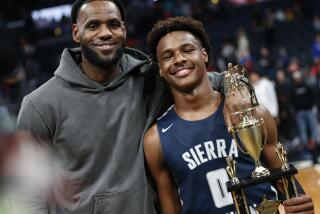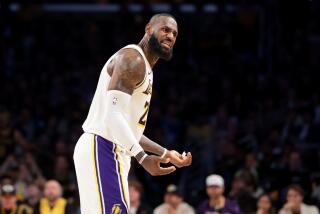Lakers Are Still Missing Hearn’s Voice of Reason
Here we are, two games into the Lakers’ second postseason playing short-handed, playing without the soundtrack of their lives. The Four Future Hall of Famers did what they were supposed to do Monday night, which was defeat the Houston Rockets at home, but Doug Collins was thinking about the Hall of Famer no longer behind the mike as the Lakers wrapped up their Game 2 victory.
“This game is about in the refrigerator, as our beloved Chick Hearn would have once said,” Collins said near the end of TNT’s telecast. “We sure miss him when we come in here and don’t see Chick anymore.”
So do thousands of Laker fans who have been deprived of a marquee matchup for the ages during these last 84 games.
What would Chick have made of this Laker team?
He had experience hosting “Bowling for Dollars,” but never “Bawling for Dollars.”
He used to regard the Laker players as his surrogate children, but he never had to send any of them to their rooms without dinner.
How many times would he have shouted, “Shoot the ball, Kobe!” during that last game at Sacramento?
As many times as he would have shouted, “The Lakers are standing around!” during that first playoff game against Houston?
Or would Chick have even made it to this point during this padded cell of a season?
Hearn often said he could never imagine quitting his job as Laker announcer. But if any team could have driven him into retirement, it would have been this one.
Before he left, however, ears and egos surely would have been scorched. As Laker owner Jerry Buss says in the new book “Chick: His Unpublished Memoirs and the Memories of Those Who Knew Him,” Hearn “was not a homer. He really took a lot of pride in calling it exactly as he saw it without softening it for the home crowd. That infuriated some people.
“On the other hand, over the years, you began to appreciate it, because you knew what he was calling was what was actually happening.”
Al Michaels narrates a “Best of Chick” CD that comes with the book. On it, Michaels observes that “Although he suffered and exulted like any Laker fan, Chick’s greatness as a broadcaster had a lot to do with his unrelenting honesty -- the fact that you could count on him to tell the truth.
“He was able to shift seamlessly in the course of a game from reporter to comedian to coach, praising or scolding the Lakers as he saw fit. But it was the journalistic integrity of his calls that was the backbone of his appeal.”
It was a hard-fought integrity. In his book, co-written with Times sportswriter Steve Springer, Hearn recalled one of his many battles with Jack Kent Cooke, then the Laker owner, over the tone of his broadcasts. Once, an angry Cooke called Hearn into his office the morning after a loss to the Oscar Robertson-led Cincinnati Royals.
Cooke had a tape of the previous night’s game, and he played it for Hearn, silently taking notes through the first quarter.
At the end of the period, Cooke shut off the machine and told Hearn, “You said 15 times -- 15 times, Mr. Hearn -- how great Cincinnati was. Twice, you mentioned that the Lakers played well.”
Hearn nodded and said, “That’s right.”
Cooke: “How do you account for that?”
Hearn: “What was the score at the end of the quarter?”
Cooke: “I don’t know what the score was.”
Hearn: “Well, I’ll tell you. The score was 43-10 in favor of Cincinnati. Do you want me to make a fool of myself? And of you?”
Cooke grumbled, no, he did not, and ordered Hearn to “get out of here and go on your trip.”
Because Hearn died before he could finish his autobiography, Springer conducted more than 100 interviews to flesh out the book as a sort of oral-history celebration of Hearn’s life and career. In one interview, longtime NBA executive Pat Williams talked about having Hearn as a guest on one of his pregame talk shows.
“He was a fabulous interview because he could not dance around the truth for all the money in the world,” Williams said. “He was constitutionally incapable of doing anything but sharing exactly what he felt.
“You’d ask him, ‘How is Shaq doing?’
“He’d say, ‘Shaq is playing very poorly.’
“You’d ask him, ‘How are Shaq and Kobe getting along?’
“He’d say, ‘Not well at all, Pat.’
“That was Chick.”
The CD spans 40 years of Hearn play-by-play calls, including a brief snippet of his work during the 1962 Finals between the Lakers and the Boston Celtics. This was Hearn in his mid-40s, his voice sharp and vibrant, his delivery furious but never out of control. The recording is 42 years old, yet by the end of a frenzied late-game sequence, the listener is convinced when Hearn breathlessly opines, “This series has to go down in history! I think we can go the rest of our lives and never see one like this!”
The contrast to Hearn’s final Laker broadcast, June 12, 2002, is startling. Hearn, having missed most of the regular season while recovering from heart surgery, seems exhausted as he strains to count down the final seconds of the Lakers’ final-round sweep of the New Jersey Nets.
“It was a seesaw struggle, and it was one of those games that you hate to see either team lose,” Hearn said wearily. “Now, another thing that’s always very hard is to say goodbye. And thank you.... I want to promise you that, God willing, Stu [Lantz] and I will be back next year and that won’t be long, comin’ around, and we’re wondering what deals they’ll make in the off-season....”
Hearn died less than two months later. The Lakers have seemed adrift ever since.
Jeanie Buss could have been speaking on behalf of the organization when she says in the book, “I don’t think I’ve recovered from Chick’s death yet. The Lakers are going to go on and win more championships, and there are going to be so many great moments to come. But it’s never going to be the same.”
More to Read
All things Lakers, all the time.
Get all the Lakers news you need in Dan Woike's weekly newsletter.
You may occasionally receive promotional content from the Los Angeles Times.






